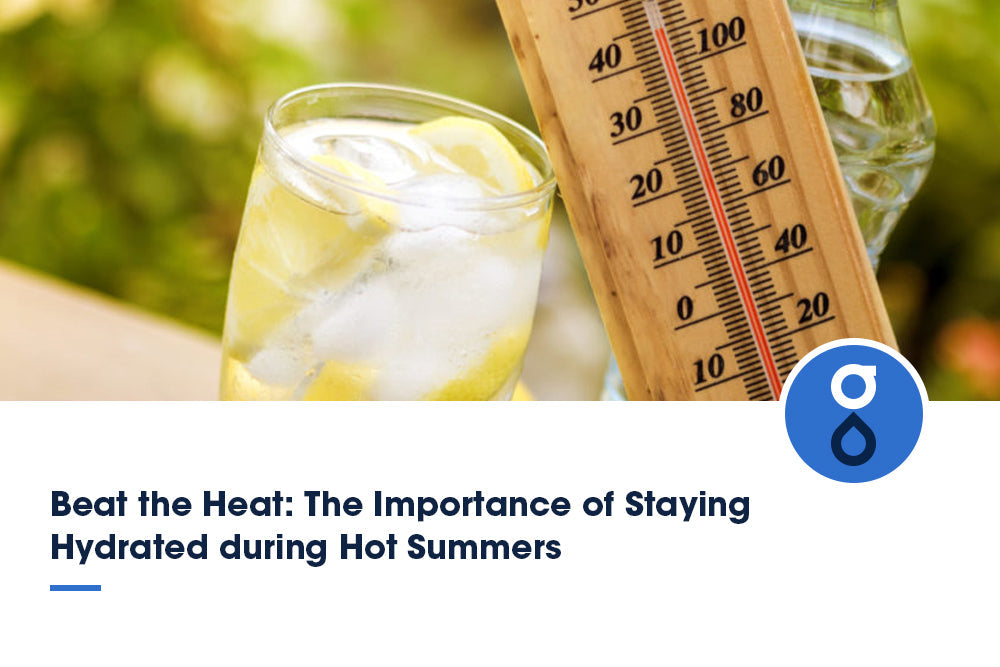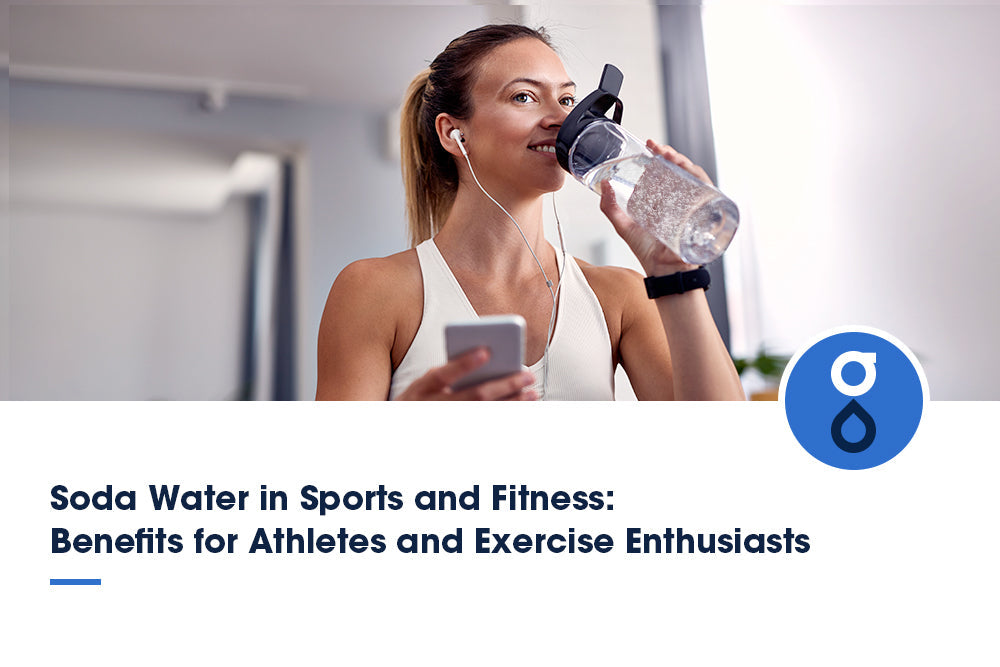Table of Contents:
Signs of dehydration in hot weather
The role of water in regulating body temperature
The dangers of heat exhaustion and heat stroke
Foods and drinks that help with hydration
Hydration tips for hot summer days
FAQs
Conclusion
As the mercury rises, so does your body's need for hydration. Isn't it frustrating when the summer sun beats down relentlessly, leaving you feeling parched and drained? You're not alone. Dehydration can sneak up on you, especially during hot summer months when you're more prone to losing fluids through sweat. But don't fret - this article is here to help.
We'll guide you through the signs of dehydration, explain how water plays a pivotal role in regulating your body temperature, and even highlight the dangers of heat exhaustion and heat stroke. You'll also discover foods and drinks that can help keep you hydrated, along with handy tips for staying refreshed on those sizzling summer days. So, get ready to beat the heat and stay healthily hydrated.
Signs of dehydration in hot weather

If you're feeling unusually thirsty, tired, or experiencing headaches in this sizzling weather, you're likely not drinking enough water - these are classic signs of dehydration that shouldn't be ignored. Dry mouth, dizziness, and, in severe cases, rapid heartbeat and breathing are some other telltale signs you should watch out for.
You might think you need to drink more, but several hydration misconceptions can lead you astray. For instance, it's a common myth that only excessive sweating leads to dehydration. You can become dehydrated even if you're not sweating profusely. This is why following water intake recommendations is essential, which suggests drinking at least eight glasses daily.
The role of water in regulating body temperature

Water plays a crucial role in regulating body temperature. Its unique properties allow it to absorb and release heat more effectively than any other substance in the body. This makes water a key player in temperature regulation.
When exposed to the sun, the body works hard to maintain its ideal temperature. Sweating occurs as a cooling mechanism if the body starts to get too hot. As the water in sweat evaporates, it pulls heat away from the body, helping to cool it down.
However, it is essential to continually replenish the body's water supply for this process to work effectively. This is where hydration becomes necessary. Increasing water intake during hot summers is not only about preventing dehydration but also about providing the body with the water it needs to regulate its temperature.
The dangers of heat exhaustion and heat stroke
Lounging under the scorching sun for too long can lead to serious health problems like heat exhaustion and heat stroke. These conditions can sneak up on you, especially during hot, humid summers when you engage in outdoor activities. Recognizing symptoms is vital for your safety. Here are some telltale signs to look out for:
- Excessive sweating, fatigue, and thirst are common in heat exhaustion.
- With heat stroke, you might experience a high body temperature, rapid pulse, or even confusion.
- If you feel faint or nauseous, it could be a sign your body is overheating.
Understanding these health implications, it's crucial to take preventive measures. Always hydrate before, during, and after your outdoor activities. Wear loose, light-colored clothing and use a sun hat or umbrella for shade. And remember, never leave kids or pets in a parked car during a hot day.
Emergency responses are vital if you or someone else show signs of heat stroke. Call 911 immediately, move the person to a cooler place, and try to lower their body temperature with cool, not cold, water.
Foods and drinks that help with hydration
Hydrating Fruits: Stay refreshed with water-rich fruits

Stay refreshed and quench your thirst with juicy watermelon slices or hydrating, succulent grapes. These water-rich fruits are delicious and help keep your body hydrated. Watermelon, consisting of about 92% water, is perfect for beating the summer heat. Its high water content replenishes fluids in your body, making it an excellent choice for hydration. Similarly, grapes are packed with water, making them a hydrating snack.
Vegetable Power: Nourish and hydrate with hydrating veggies

Vegetables are not only great for hydration but also for providing essential vitamins and minerals. Cucumbers comprise about 96% water, making them a perfect choice to stay hydrated. They are also rich in antioxidants and help to flush out toxins from the body.
Another hydrating vegetable is celery, which contains electrolytes that help to maintain fluid balance. Its high water content helps to keep you hydrated while providing fiber for healthy digestion. Lettuce, especially iceberg lettuce, is also an excellent source of hydration as it contains about 96% water.
Additionally, zucchini, radishes, and bell peppers are hydrating vegetables packed with nutrients that can help replenish your body's water levels. Incorporate these veggies into your diet to stay hydrated and healthy.
Hydration in a Glass: Quench your thirst with refreshing beverages

Coconut water is a natural source of electrolytes and is low in calories, making it a perfect choice for rehydration. Herbal teas, such as peppermint or chamomile, provide hydration and offer various health benefits. Citrus fruits like oranges and lemons can be squeezed into the water to add flavor and hydration. Lastly, sports drinks can be consumed after intense exercise to replenish electrolytes lost through sweat.
Soups and Broths: Hydrate and nourish with delicious liquid meals

Delicious liquid meals like soups and broths are a fantastic way to nourish your body while hydrating it. These comforting dishes are packed with water, making them an excellent choice for staying hydrated. Not only do soups and broths provide essential hydration, but they also offer valuable nutrients and electrolytes.
Vegetable-based soups are particularly hydrating, as they contain a high water content and vitamins and minerals. Adding bone broth to your diet can also be beneficial, as it is rich in collagen and amino acids that support skin health and joint function.
Hydration Hacks: Tips and tricks for staying hydrated throughout the day
One hydration hack is to carry a reusable water bottle wherever you go. This will be a constant reminder to drink water and make it easily accessible. Another tip is infusing your water with fruits or herbs to add flavor and make drinking more enticing.
Additionally, setting reminders or alarms on your phone can help you stay on track with your hydration goals. Another trick is to snack on hydrating foods such as watermelon, cucumber, or celery, which have high water content. Lastly, drinking herbal teas or coconut water can improve your daily hydration needs.
Hydration tips for hot summer days
When it's sizzling outside, knowing how to keep your hydration levels up becomes crucial, and it's not about chugging gallons of water. It's about smart hydration, recognizing your body's needs, and debunking hydration myths. Here are some quick tips to help you stay hydrated during the hot summer days:
- Stay active: Sports hydration isn't just for athletes. Regular physical activity helps your body maintain a healthy hydration balance.
- Eat hydrating foods: Incorporate water-rich fruits and vegetables into your diet. They can contribute to your daily water intake.
- Use hydration supplements: These can be beneficial, especially if you're spending the day outdoors or traveling. Travel hydration is often overlooked.
- Protect your skin: Summer skincare is about more than just sunblock. Your skin needs hydration to stay healthy and glow.
- Don't fall for hydration myths: Drinking eight glasses of water a day isn't a one-size-fits-all solution. Listen to your body's needs.
Remember, hydration is a continuous process, not a one-time event. Making these tips a part of your daily routine can go a long way in helping you stay well-hydrated during the scorching summer heat.
FAQs
How does humidity affect our body's ability to stay hydrated during hot summers?
Humidity's health impacts can be tough on your body, especially during hot summers. It reduces sweating efficiency, your body's natural cooling mechanism, making it harder to stay hydrated. In tropical climates, this effect is even more pronounced.
How does hydration affect our energy levels and concentration during summer?
Proper hydration provides an energy boost and helps combat summer lethargy. It also promotes mental clarity, keeping our brains sharp and active.
Is it possible to drink too much water, and can it be harmful?
Drinking too much water can lead to water intoxication or dilutional hyponatremia. This is often seen in athletes as exercise-induced hyponatremia, where you're drinking more water than your kidneys can excrete.
Conclusion
So, you've got the lowdown on staying hydrated this summer. Remember, don't ignore the signs of dehydration, and understand water's role in your body. Be aware of heat-related dangers and fill up on hydrating foods and drinks. Follow these hydration tips, and you'll beat the heat like a pro. Make your summer memories about fun, not sunstroke. Drink up and stay cool, friend!
















